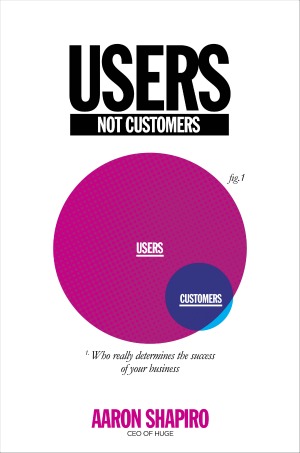BY FC Expert Blogger Aaron Shapiro

Why doesn't digital talent want to work at your company? It’s not because you’re a consumer packaged goods company, rather than Google. It’s not because you’re in Ohio instead of Silicon Valley. It’s not because your salaries are too low, or because you don’t offer free food and laundry services.
It’s because you’re not providing them the right opportunity. The talent you want would be happy to work in an un-air-conditioned garage in New Mexico if it meant the chance to change the world.
This, the opportunity to do great things, to make a real difference, is what drives most digital talent--whether they’re developers, designers, producers, marketers or business folks.
Most companies don’t offer this, so they skip your company and work somewhere that’s more innovative and exciting. End of story. But the good news is that you can offer them something exciting and great. The promise of changing a giant, behind-the-times organization into an Internet-savvy business is an incredibly exciting challenge and a big way for ambitious people to make an impact.
But it takes more than lip service to make the sale. Job candidates and new hires with digital chops must truly believe in the company’s dedication to digital transformation and they must see that they are empowered to make this change. Trouble is, many big businesses aren’t structured to deliver on this type of opportunity. The attributes of a soul-crushing, Sisyphean, anti-digital workplace run deep.
Digital talent won’t want to work at your company if:
 When all of these digital-talent deterring points are addressed, company leadership has effectively and proactively demonstrated the company’s dedication to a digital transformation. It is at this time that their words, a broadly communicated firm stance on the significance of the company’s digital goals, will make the most impact. Without this conspicuous top-down support, politics in the organization or simply one influential disbeliever can hinder the effort, limit the extent of digital integration possible, and discourage valuable employees.
When all of these digital-talent deterring points are addressed, company leadership has effectively and proactively demonstrated the company’s dedication to a digital transformation. It is at this time that their words, a broadly communicated firm stance on the significance of the company’s digital goals, will make the most impact. Without this conspicuous top-down support, politics in the organization or simply one influential disbeliever can hinder the effort, limit the extent of digital integration possible, and discourage valuable employees.
You need them more than they need you. Demand for their services is so high, they can afford to be finicky. If they don’t like where they’re working, another firm with a more attractive culture and more grand opportunity will quickly swipe them up. That could be your company. But it could just as easily be someone else.
Related articles:
For more leadership coverage, follow us on Twitter and LinkedIn.
===========
Visit us: http://www.agentsentral.com | Email us: info@agentsentral.com
This blog is written by a member of our expert blogging community and expresses that expert's views alone.
Some digital companies are hiring--and in fact are in hot competition for certain types of employees. But you don't have to be Google to attract top-tier talent.

Why doesn't digital talent want to work at your company? It’s not because you’re a consumer packaged goods company, rather than Google. It’s not because you’re in Ohio instead of Silicon Valley. It’s not because your salaries are too low, or because you don’t offer free food and laundry services.
It’s because you’re not providing them the right opportunity. The talent you want would be happy to work in an un-air-conditioned garage in New Mexico if it meant the chance to change the world.
This, the opportunity to do great things, to make a real difference, is what drives most digital talent--whether they’re developers, designers, producers, marketers or business folks.
Most companies don’t offer this, so they skip your company and work somewhere that’s more innovative and exciting. End of story. But the good news is that you can offer them something exciting and great. The promise of changing a giant, behind-the-times organization into an Internet-savvy business is an incredibly exciting challenge and a big way for ambitious people to make an impact.
But it takes more than lip service to make the sale. Job candidates and new hires with digital chops must truly believe in the company’s dedication to digital transformation and they must see that they are empowered to make this change. Trouble is, many big businesses aren’t structured to deliver on this type of opportunity. The attributes of a soul-crushing, Sisyphean, anti-digital workplace run deep.
Digital talent won’t want to work at your company if:
- Every element of their work will be pored over by multiple layers of bureaucracy. Even if that’s how the rest of the company operates, it can’t spill into the digital department. In a technology environment, new products and businesses spring up daily and a new endeavor can go from conception to launch in a matter of months. Reining in the momentum will be read as inaction and a clear signal the company isn’t willing to grasp the new way of the world.
- Mediocre is good enough. While clocking out at 5 p.m. is attractive to some, it will discourage digital talent. They want to be expected to do something great. They want to be pushed. They care about their work. Their leadership, and those they rely on to get things done, must match their appetite for success.
- Trial and error is condemned. The freedom to try out new ideas allows employees to take initiative, make decisions, and learn from their mistakes. It also demonstrates an attractive and inspiring entrepreneurial spirit.
- Your company is structured so it takes a lifetime to get to the top, and as such there are no digital experts in company-wide leadership positions. Digital talent--often in their 20s and 30s--need to see a clear path for uninhibited career development that’s based on merit, not years spent, and that’s beyond the confines of the digital department. If they don’t, they won’t see a reason to stay with the company in the long term.
- Your offices are cold, impersonal and downright stodgy. It may sound like it conflicts with the “you don’t need to be in Silicon Valley point,” but appreciate the nuance. A traditional office layout is designed to communicate power among certain individuals and barriers between departments. This does not support the collaborative ethos which is intrinsic to the web. Companies should do everything possible to provide the digital team friendlier, open office space. A location in a hip, young neighborhood (which surely exists in every mid- to large-sized city) is also a big plus.
 When all of these digital-talent deterring points are addressed, company leadership has effectively and proactively demonstrated the company’s dedication to a digital transformation. It is at this time that their words, a broadly communicated firm stance on the significance of the company’s digital goals, will make the most impact. Without this conspicuous top-down support, politics in the organization or simply one influential disbeliever can hinder the effort, limit the extent of digital integration possible, and discourage valuable employees.
When all of these digital-talent deterring points are addressed, company leadership has effectively and proactively demonstrated the company’s dedication to a digital transformation. It is at this time that their words, a broadly communicated firm stance on the significance of the company’s digital goals, will make the most impact. Without this conspicuous top-down support, politics in the organization or simply one influential disbeliever can hinder the effort, limit the extent of digital integration possible, and discourage valuable employees. You need them more than they need you. Demand for their services is so high, they can afford to be finicky. If they don’t like where they’re working, another firm with a more attractive culture and more grand opportunity will quickly swipe them up. That could be your company. But it could just as easily be someone else.
Related articles:
- Want To Keep (And Motivate) Your Best Employees? It's Not About The Money
- How To Discover Amazing Talent For Your Startup
- Your Next High-Paying Job May Be In An Industry That Was Never On Your Radar
- What It Takes To Get A Job At Google
For more leadership coverage, follow us on Twitter and LinkedIn.
===========
Visit us: http://www.agentsentral.com | Email us: info@agentsentral.com
